It wasn't pretty, but we made it to Inauguration Day. These last four years have taught the US a lot about itself — so what have we learned?
We've learned that when it comes to the continued functioning of US democracy, two institutions have acquitted themselves particularly well. The first is the military — one reason the events of January 6 didn't turn into an actual coup is because the military never wavered in their commitment to the US Constitution, and stayed out of domestic US politics. For four years, the military brass demonstrated the independence of its chain of command, and resisted Trump's pressure to do his domestic political bidding. The one time it didn't — clearing out Lafayette Park so that Trump could stage a photo op — was such a chastening moment that the Chairman of the Joint Chiefs apologized even for the perception of impropriety. One shudders to think what would have happened if senior members of the US military were more receptive to Trump's strongman inclinations.
The other institution that deserves praise is the judiciary. As dozens of courts across the country have proved in the interregnum between Election Day and Inauguration Day, the US court system remains free of political interference and intervention, even when the most powerful political figure in the country launches false claims and files frivolous lawsuits designed to muddy the political waters. While Trump's claims of election fraud have indeed succeeded in convincing a segment of the US electorate that Joe Biden didn't win the election legitimately, US courts were having none of it, and remain among the robust political institutions in the United States today.
That's the good news. The bad news is that Trump's stoking of political divisions demoralized a civil service that for generations took pride in being non-partisan — a near-impossibility during the Trump years. It's also further widened already an unworkable political divide in Congress, making it impossible for Congress to rise above the political fray to attend to the business of the people. What's more, Congress has lost much of its ability to act as an effective check on the Executive, one of its most important functions.
Furthermore, for many Americans Trump's assault against accepting electoral defeat forever tarnishes Biden's electoral victory, and possibly the entire electoral process going forward. Social media has been elevated from a sideshow of politics to arguably its most important arena, raising real and difficult questions about freedom of speech, who is responsible for policing these platforms and what responsibilities and limitations political leaders have in using them. And it's fair to say that Trump has changed expectations for the kind of character people will expect in future US presidents, for better and worse.
With Biden assuming office, the US returns to more traditional political leadership. But that doesn't mean the United States will suddenly regain the stature it enjoyed before Trump took office — too much has changed for both the US and the world to suddenly turn back the clock. What has changed most is the depth of the division within US society today. For the last four years, the political dysfunction in the US emanated from the very top; the events of the last few weeks show that the political dysfunction will persist well after Trump's departure from the Oval Office. If Biden hopes to change the world he's inheriting from Trump, he'll need to begin at home.